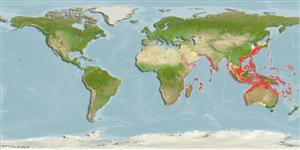Common names from other countries
>
Scombriformes (Mackerels) >
Gempylidae (Snake mackerels)
Etymology: Thyrsitoides: Greek, thyrsites, -ou = stalk of a plant, an ornament like a pine cone borne by Bacchus + Greek, oides = similar to (Ref. 45335).
More on author: Fowler.
Environment: milieu / climate zone / depth range / distribution range
Ecología
marino bentopelágico; rango de profundidad 0 - 400 m (Ref. 6181). Deep-water; 39°N - 44°S, 25°E - 134°W (Ref. 6181)
Indo-West Pacific: Red Sea to South Africa and New Caledonia, north to Japan. Recently reported from Tonga (Ref. 53797).
Tamaño / Peso / Age
Maturity: Lm ? range ? - ? cm
Max length : 200 cm TL macho / no sexado; (Ref. 4408); common length : 100.0 cm SL macho / no sexado; (Ref. 9784)
Espinas dorsales (total) : 17 - 19; Radios blandos dorsales (total) : 16 - 17; Espinas anales: 1; Radios blandos anales: 16 - 17; Vértebra: 34. Two lateral lines, originating above the upper angle of gill opening, branching below the 4th dorsal-fin spine or slightly behind it, upper line running along the first dorsal-fin base and ending below about the end of the first dorsal fin, lower line abruptly curved backward from bifurcation, running mid laterally to the base of the middle caudal-fin ray. Body color is dark brown with slightly metallic reflections, sometimes slightly paler on belly. Dorsal fin membranes with black markings.
Mesobenthopelagic, down to depths of 400 m or more, often at the surface at night around Okinawa, Japan (Ref. 6181). The largest populations are probably on the slope of seamounts or ridges (Ref. 6181). Feeds on a variety of mesopelagic fish, squid and crustaceans (Ref. 6181).
Life cycle and mating behavior
Maturities | Reproducción | Spawnings | Egg(s) | Fecundities | Larva
Nakamura, I. and N.V. Parin, 1993. FAO Species Catalogue. Vol. 15. Snake mackerels and cutlassfishes of the world (families Gempylidae and Trichiuridae). An annotated and illustrated catalogue of the snake mackerels, snoeks, escolars, gemfishes, sackfishes, domine, oilfish, cutlassfishes,. scabbardfishes, hairtails, and frostfishes known to date. FAO Fish. Synop. 125(15):136 p. (Ref. 6181)
IUCN Red List Status (Ref. 130435)
CITES (Ref. 128078)
Not Evaluated
Threat to humans
Harmless
Human uses
Pesquerías: escaso valor comercial
Herramientas
Special reports
Download XML
Fuentes de Internet
Estimates based on models
Preferred temperature (Ref.
115969): 15.3 - 28, mean 23.7 (based on 1045 cells).
Phylogenetic diversity index (Ref.
82804): PD
50 = 1.0000 [Uniqueness, from 0.5 = low to 2.0 = high].
Bayesian length-weight: a=0.00427 (0.00204 - 0.00890), b=3.15 (2.96 - 3.34), in cm Total Length, based on LWR estimates for this species & (Sub)family-body (Ref.
93245).
Nivel trófico (Ref.
69278): 4.2 ±0.58 se; based on food items.
Resiliencia (Ref.
120179): Muy bajo, población duplicada en un tiempo mínimo superior a 14 años (Preliminary K or Fecundity.).
Fishing Vulnerability (Ref.
59153): Very high vulnerability (90 of 100).
